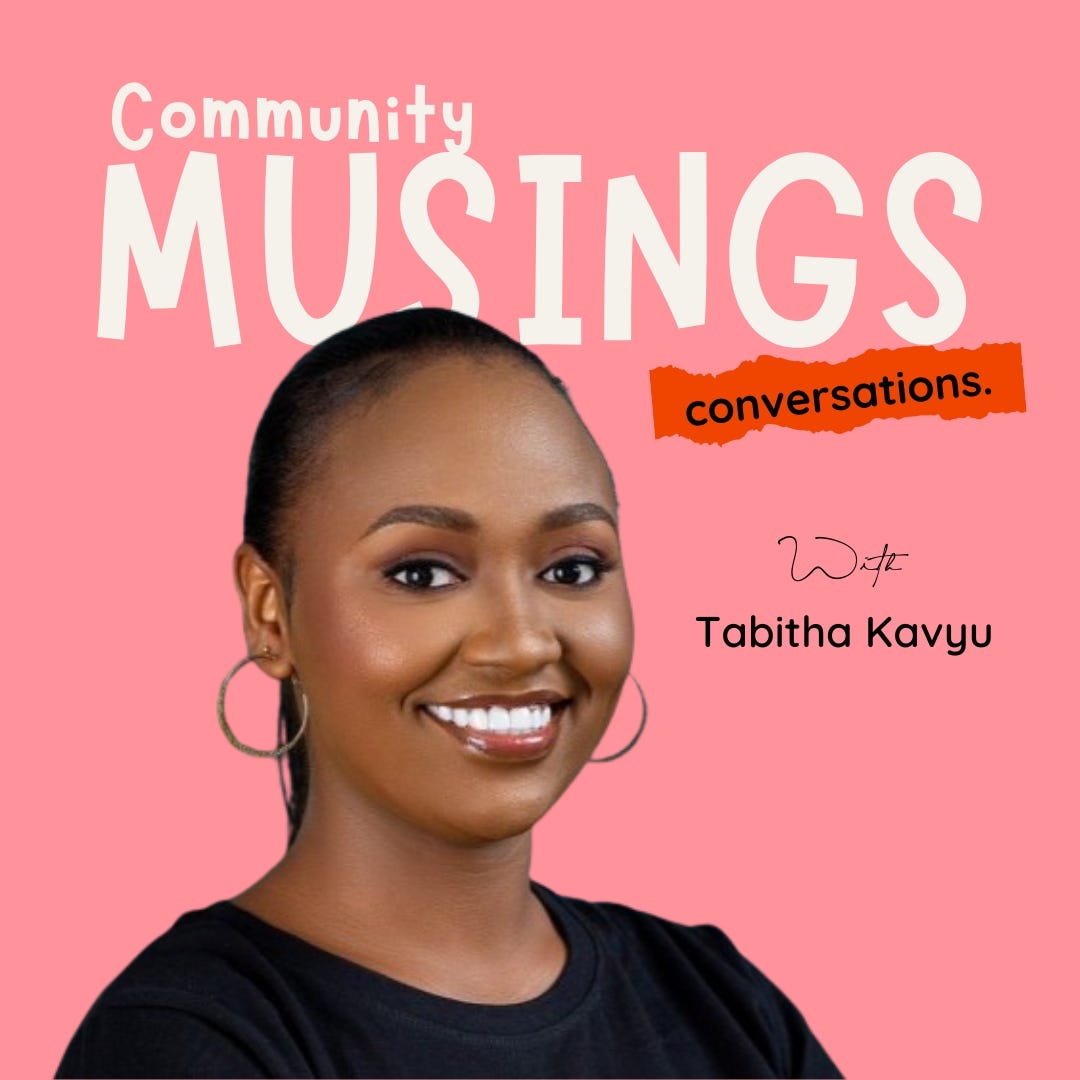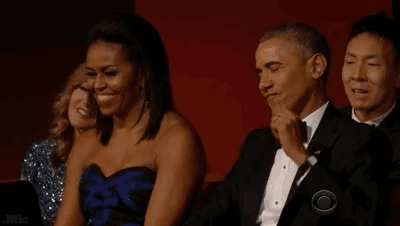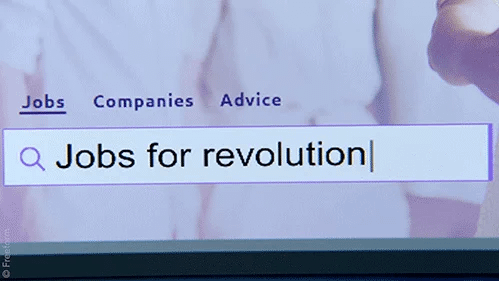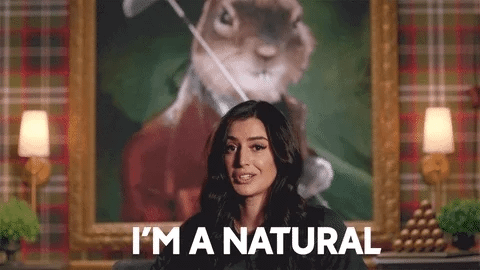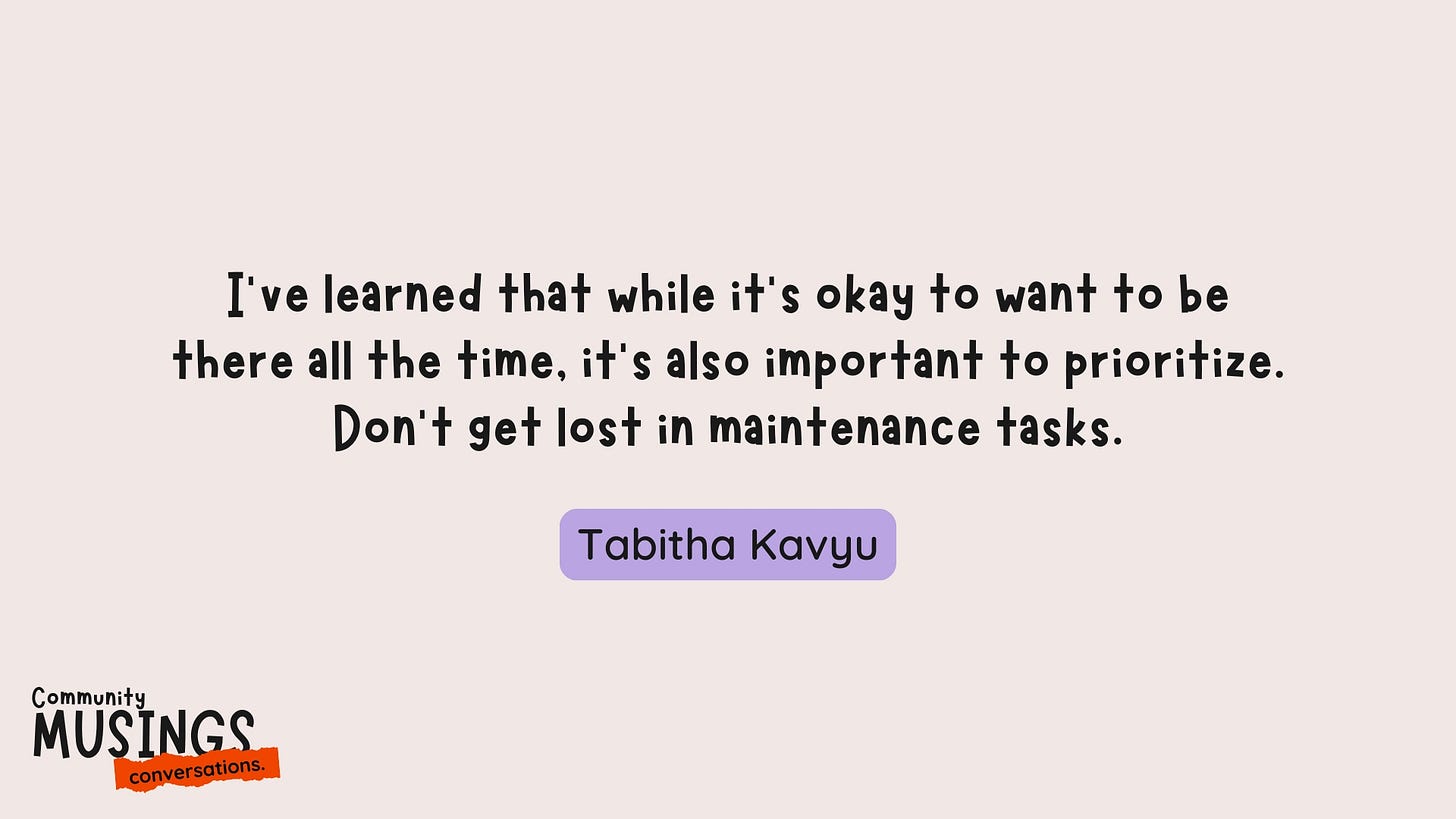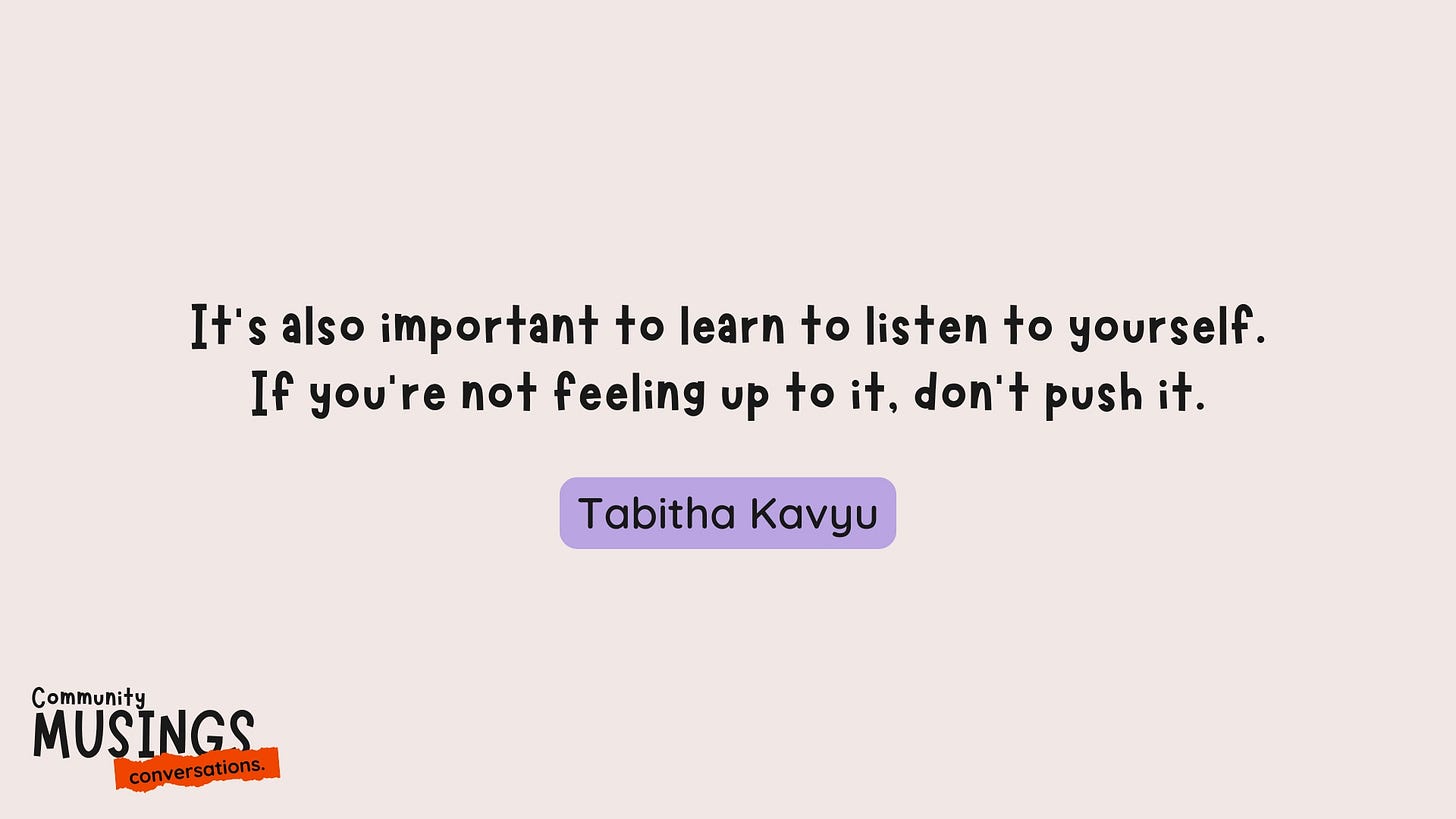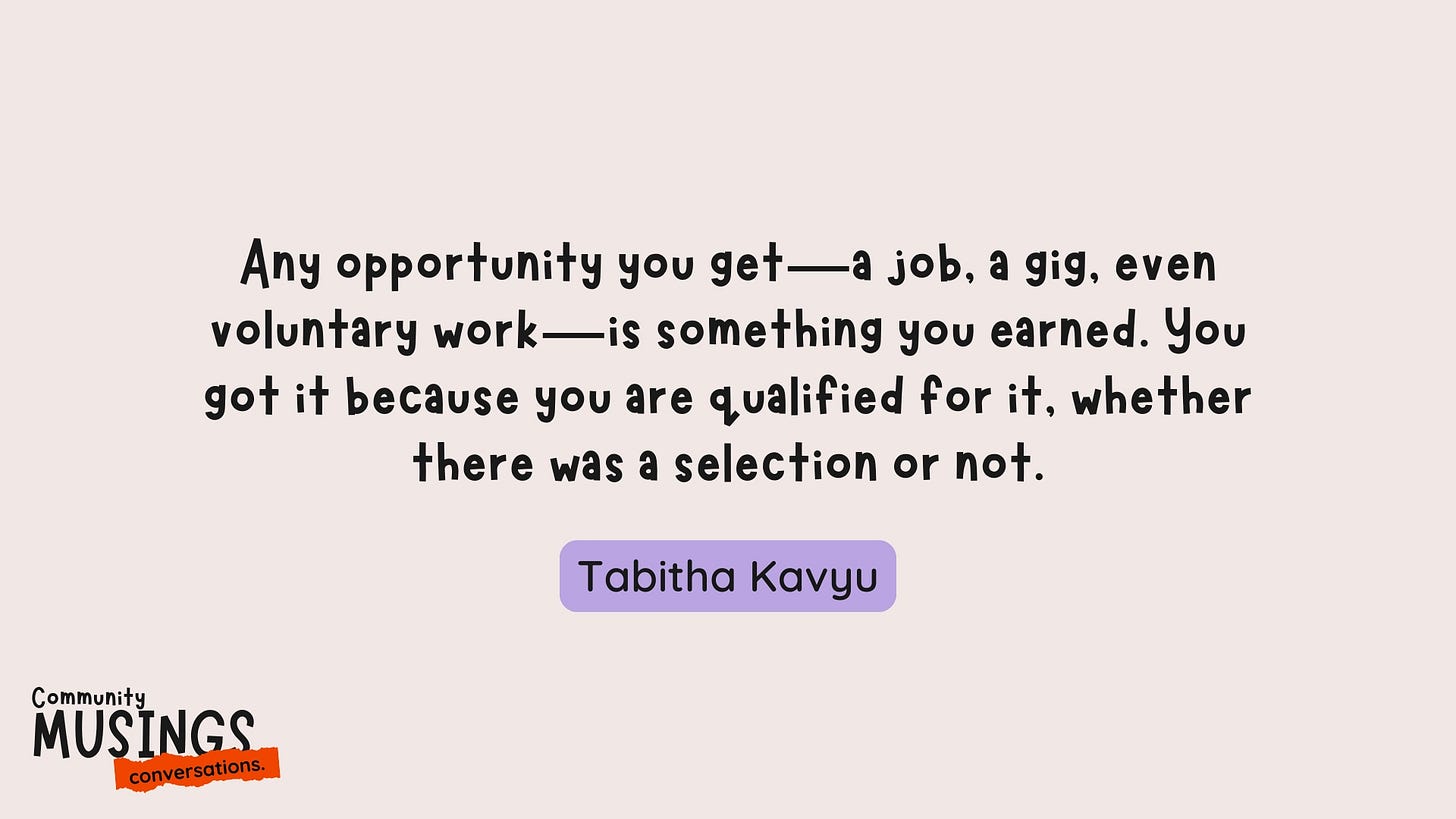Career Choices, Tough Days, Self-doubt & Listening
Tabitha Kavyu, Senior Community Manager at AltSchool Africa shares her secrets to thriving as a Community Leader
Behind every thriving community is a a human with emotions and things to deal with. This is Community Musings: Conversations. — a series dedicated to navigating the mental and emotional rollercoaster of building a career in community.
p.s: this is the last edition of this series 🥹
Meet Tabitha Kavyu
Tabitha Kavyu is an amazing person who is exceptionally leading communities both within AltSchool and the global tech space. She has a great passion for bringing people together and connecting them with each other, and is a big advocate for the tech space in Kenya. You will always find her supporting tech initiatives in Kenya and even beyond Kenya. Her commitment to excellence and her 100% effort in every endeavor make her truly inspiring.
Here is her story!
(get a cup of coffee or a snack to dig in ‘cause this is a lot of tea 😁)
Here was this opportunity to turn something I enjoyed doing in my free time into a career
Tabitha: For me, it was a case of already being involved without realizing it, and then I just had that moment of, “Oh, okay, you’re actually doing this already, and you can carve out a path and make a career out of it.”
It all started when I was a volunteer at the Google Developers Student Club on campus. I was at the University of Nairobi, and in my first days there, I saw them hosting events. I didn’t fully understand what was happening since I was just a first-year student, but I wanted to do something. I wanted to help in some way, to show up. I might not have understood the technical aspects, but I wanted to support them. So I would help with registering people or doing simple things like that. When the organizers then were about to graduate, they told me to apply and take it up. I was hesitant, thinking, “I’m just a first-year going into my second year. I don’t know much about this.” But they encouraged me, saying they’d seen my passion and how I enjoyed organizing & getting things ready. So, I applied and got in.
The beauty of being part of the Developers Student Club is that it’s a Google community program, which means we could network with developer leads in other countries and even connect with some Googlers. So that's how I met Auwal, who was our program manager, and Aniedi. Through interacting with them, I realized the work they were doing was something I could do, and that was something I wanted for myself.
I was studying computer science, so there was this idea that I’d eventually work in engineering because I didn’t know how one finished school and became a program or community manager. There wasn’t a clear path explaining it. I thought opportunities like that only came to people after a long time. Then I discovered that community management was an actual profession- what we were doing as volunteers was something people did professionally.
While volunteering with the Developers Student Club, I recognized that hosting events, bringing people together, and supporting them however I could, was something that was already in me. I think as community managers we realize that most of us are people that like helping people, so you are just tapping into your gift, and making something out of it. So when I realized that I could do that, I told myself that I was going to do this thing in the years to come. Becoming a community manager wasn’t my initial dream, but I started to think it could be.
I then interned at Talent QL, working in recruiting. Then AltSchool came along looking for a community manager, and since I was active in the Kenyan tech space; always attending events and volunteering, they saw my enthusiasm for community work and asked if I’d be interested. I thought about it and initially felt I’d pursue this later on, like after taking certifications or meeting other qualifications, but here was this opportunity to turn something I enjoyed doing in my free time into a career.
My boss encouraged me, saying, “Think about where you see yourself in five years. Do you want to be heading community at this company or heading recruiting?” I had to choose. But I’d always loved the community aspect, so I thought, “If I have the chance to grow in this, then why not maximize my strengths?”
So, that's how I found myself here and I'm still here.
I haven’t had the experience of job hunting much but…
Tabitha: I haven’t had the experience of job hunting much because I pretty much finished school, did an internship at Talent QL, and transitioned into Alt School, where I’ve been ever since. So I haven’t gone through that phase of struggling to find a job. But I know others, like fellow community managers around me, who’ve had those moments—looking for jobs, wondering, “How do I explain this?” or, “I’ve landed a job, now how do I approach it once I get there?” So, I’ve mostly seen it from a second-hand perspective, and I know it’s not easy, easy, easy.
When I look at the Kenyan market, not many people are aware of community management. It’s gradually gaining recognition, with people starting to see the need for a community manager. But, as you know, there’s still confusion about what community management really entails. Sometimes, when you’re searching for community roles, you don’t find them, or if you do, they lean more toward social media management, which isn’t quite what one is looking for. I’m interested in roles where companies genuinely understand they have a community and need someone to nurture it. I often check job listings and wonder, “Is it that people don't know much about this?” I realize it’s still a new field, but I know businesses could benefit significantly from investing in communities and hiring dedicated community managers. And that shows that some people aren't really aware of how communities can help them grow their businesses.
However, I noticed a shift when I experimented with changing my LinkedIn location to the U.S. I was curious to see if it was a Kenyan-specific issue. Almost immediately, I started receiving job notifications—and they haven’t stopped. I don’t open them because I’m not actively job hunting, but I do look at the job descriptions to see what they’re looking for. Many international companies seem to have a better understanding of community management, knowing exactly what they want, and even distinguishing between community manager, community moderator, and community specialist roles. It’s reassuring to see, and I keep these listings in mind for the future, if I ever decide to apply.
Sometimes, I feel like I need something else; a new challenge
Tabitha: As for switching careers, of course, I have those thoughts, especially given my background in engineering—computer science, and software engineering. Community work is natural to me, something I was good at, and I turned it into a career. But sometimes, I feel like I need something else, a new challenge. Even though community management is far from easy, yet, there are moments where I wonder if I should have stayed in engineering, or if there’s a way to do both. But honestly, even though some might think my job is just about chatting with people, managing a community is hard work. It’s tiring. Managing people is one of the hardest things, and I find I don’t have the time to explore other interests or skills I’d like to learn.
But yes, I do have those moments when I ask myself, “What other expertise could I gain?” Maybe in the future, if I get tired or want to expand my skills. I also have a bit of that fear—what if companies stop hiring community managers? What else would I have that makes me stand out? But then, I come back to thinking, “Maybe I could just learn something more in line with community management.” It’s almost like I’m coming to terms with the fact that this could be my path. Why stress over changing to something else? I focus on getting better at this community work while I have the chance. So, that’s where I’m at right now.
You’re not always going to have those perfect days
Tabitha: At some point, I think many of us feel strongly attached to our communities. It goes beyond just being a job—it’s like, “These are my people, I want to do right by them. I want to be there for them, I want to give them my all.” I’ve had moments where I feel that way, but sometimes, I just don’t have the strength.
A lot of it comes down to accepting that you’re not always going to have those perfect days. Some days, I may not be able to show up at a hundred percent, but I can still show up in other ways.
A big part of community work is support; apart from the engaging bit, there is a lot of support especially if you run a successful community. For example, at AltSchool Africa, when a community member has an issue, I often need to work with other departments to sort it out. Sometimes, my work feels like putting out fires, passing messages back and forth and it can feel like I’m not showing up for the community in other ways.
I’ve learned that while it’s okay to want to be there all the time, it’s also important to prioritize. So if I know that as soon as I open Slack, I’ll get drawn into DMs and messages, I might start with other tasks first. Spending three or four hours on Slack is still work, but if that’s all I do, I end up feeling like I wasn’t productive. I will feel like I haven't challenged my mind to think strategically or work on something more meaningful, that I'm just doing what they call maintenance tasks. And if I’m not careful that could end up being my whole day, every day, and if that happens, my job could start feeling monotonous, and I might lose motivation. So, I’ve had to tell myself that it’s okay not to get lost in maintenance tasks. I can still work on high-level tasks, like generating new ideas or strategies. Those ideas, once implemented, ultimately benefit the community.
Those days when you feel you're so tired and overwhelmed, you can do something else. It’s a matter of balance—making a conscious effort to set aside time for those productive tasks that will help the community in the long run. And sometimes, the productive task would mean personal development.
It’s also important to learn to listen to yourself. If you’re not feeling up to it, don’t push it. Forcing yourself when you’re overwhelmed can lead to disengagement, where you’re just going through the motions, and people can pick up on that energy. You won’t even feel empathetic. I’ve found myself in such situations where I should have answered in a better way but I pushed myself just to get it done. It's okay to say that you’re not in the right headspace at the moment because our job requires a lot of emotional energy, even when things are tough.
If you have set a good foundation for a community, you can rest knowing that there are people in the community, like the super members or leaders, you can trust to help keep things going. So sometimes you can even involve them and let them know that, you may be inactive but you hope that they can help to keep interactions going. That way, even if you’re not there, the community continues to provide value as you take the time you need to recharge.
It’s okay to doubt yourself when you’re trying something new
Tabitha: Imposter syndrome is something I think we all face at some point. Even when you’re experienced, self-doubt can creep in. I remember when I was first offered my role—I felt a lot of imposter syndrome. I kept wondering if I could do this professionally. What if they realized I wasn’t as good as they thought? But knowing imposter syndrome is common, helped. I reminded myself that I was chosen for a reason; I didn’t ask for this role, they saw something in me. I earned it.
Any opportunity you get—a job, a gig, even voluntary work—is something you earned. You got it because you are qualified for it, whether there was a selection or not. You need to remind yourself, first of all, that you just didn’t wake up and become you, there are a series of things that you did that made you and other people see that you deserve it.
When I started in professional community management, I didn’t know much, so I committed to learning. I found other professional community managers, followed them, and read what they shared. I didn’t use to read much, but being in this field changed that. Now, I try to learn as much as I can because there isn’t always someone to look up to in the same context. Communities vary a lot, so you can’t always follow someone else’s path—you have to carve your own. If you don't know something, it's good to be very honest with yourself and learn about it.
I’ve learned that it’s okay to doubt yourself when you’re trying something new. The key is to figure out where that doubt comes from. Are you afraid because you feel like you don't know this particular thing? Or is it a confidence issue despite having the skills? Upskilling is essential. Connecting with others in your field can make a huge difference, too. The best thing that happened to me was connecting with other community managers in Lagos, in 2022. It was reassuring to see others figuring things out, just like me. Being in that space and hearing their experiences and tips helped me realize I wasn’t alone. The more you connect with other people it becomes easier to know that you're not the only person.
Confidence comes with learning. When you understand something, it’s easier to be confident. If I don’t know something, I find out what others in my field are reading or learning, and I dig in. Upskilling doesn’t just fill knowledge gaps—it gives you the push to act. Instead of feeling unprepared, you can take steps to address your doubts. Sometimes, just talking to another community manager who’s dealt with the same thing helps. Even reading what they’ve shared can offer new insights.
Our work as community managers is not always easy to quantify. Much of the work is intangible—it’s more of a feeling thing, when you do those surveys and they say they are happy or they give an NPS score of 10 or so; you feel like, okay, this maybe means we are doing well. Because it’s hard to put into numbers, people might not fully see your value, and you might feel like you’re not doing enough or worry about job security. What I've learned over the past year is that yes, we may not know how to quantify the impact of what we’re doing, but it's very important that we always communicate our impact. It’s important to keep highlighting this, otherwise, people may not recognize that impact.
What sets me in the right direction when managing communities
Tabitha: One thing that helps me the most is learning. I have found that I get excited when I come across a new resource because I want to understand how others handle things, what their approaches are, and how they tackle challenges differently. Tapping into others’ experiences and learning how they manage things has been incredibly valuable.
When I read or take a course, I'm investing in my growth, and as I learn ideas just start to flow. Everything that I have been able to do or experiment, has come from something I read, watched, or learned. And when I read about something, I immediately want to try it out and experiment to see how it could work in my community.
Stay updated with what's happening in the community space too. What's new? Is there a new way to tackle engagement? Is there a new way to measure metrics? By keeping up with these shifts, it becomes easier to reflect on your current methods and improve on them.
Another thing I’ll say is believe in your work. If you don't believe in your work, it's even harder to navigate the hard days. I enjoy community management and that is why I always say that if you do not have it in you don't think you can walk into community management and just feel like you're going to be great over time. It takes a genuine interest because there will be hard days. For me, even when it’s challenging, it’s my path and something I enjoy. I may be tired, but connecting with my community always re-energizes me. Even when things go wrong, I try again and I look out for ways to learn and improve. It's worth the sacrifice when it's something that you enjoy doing.
Finally, you need to build with your community. Listen to them—what are their needs? Your job is to understand those needs and ensure your strategies are aligned with them. When you keep your community’s needs in mind, your work is more likely to be received in a better way. Sometimes, you post something, and there’s little response; it could be that it’s not what they’re interested in. Listening involves asking questions and paying attention to their feedback. This way, you’re not spending time on things that won’t resonate. Instead, you’re creating a space that feels relevant and valuable to your community.
Connect with Tabitha on X and LinkedIn
—
*Editor’s note: This interview has been edited for clarity and length.
- Enjoyed this piece?
- Did something stand out to you?
- Yet to subscribe?

